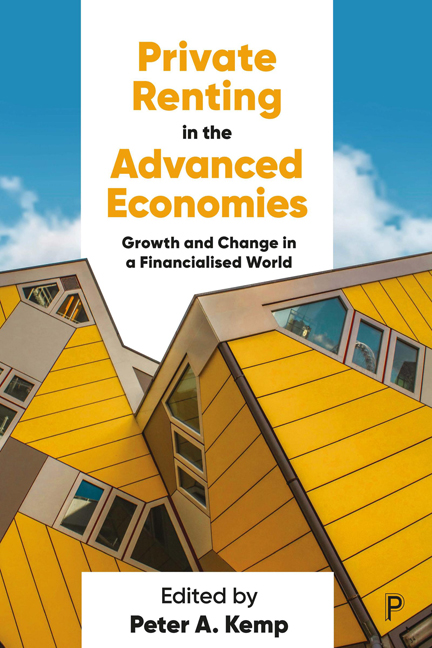Book contents
- Frontmatter
- Contents
- List of figures, tables and boxes
- List of abbreviations
- Notes on contributors
- Preface
- 1 New trajectories in private rental housing
- 2 Growth and change: private renting in Australia in the 21st century
- 3 Rental housing dynamics and their affordability impact in the United States
- 4 The Irish rental sector and the post-homeownership society: issues and challenges
- 5 Private renting in England: growth, change and contestation
- 6 Private renting in the Netherlands: set to grow?
- 7 Suppressive regulation and lower political esteem: private renting in Germany at the beginning of decline
- 8 Private renting in Denmark: foreign investors in the crosshairs
- 9 Norway: booming housing market and increasing small-scale landlordism
- 10 Private rented markets in Spain and housing affordability
- 11 The short-run impact of COVID-19 on the private rented sector
- 12 Change and continuity in private rental housing
- Index
6 - Private renting in the Netherlands: set to grow?
Published online by Cambridge University Press: 03 April 2024
- Frontmatter
- Contents
- List of figures, tables and boxes
- List of abbreviations
- Notes on contributors
- Preface
- 1 New trajectories in private rental housing
- 2 Growth and change: private renting in Australia in the 21st century
- 3 Rental housing dynamics and their affordability impact in the United States
- 4 The Irish rental sector and the post-homeownership society: issues and challenges
- 5 Private renting in England: growth, change and contestation
- 6 Private renting in the Netherlands: set to grow?
- 7 Suppressive regulation and lower political esteem: private renting in Germany at the beginning of decline
- 8 Private renting in Denmark: foreign investors in the crosshairs
- 9 Norway: booming housing market and increasing small-scale landlordism
- 10 Private rented markets in Spain and housing affordability
- 11 The short-run impact of COVID-19 on the private rented sector
- 12 Change and continuity in private rental housing
- Index
Summary
Introduction
When private renting reached an all-time low of about 10 per cent of the housing stock in 2009, the Netherlands became one of the countries in Europe with the smallest private rental sector (PRS) (Haffner, 2014; 2018; Haffner et al, 2018). Private renting had decreased from a share of 60 per cent of the stock since the Second World War. This decline could not be called a surprise after decades of subsidising homeownership and social renting, while rents were controlled.
More recently, a turnaround took place with an increase of private rental stock. The most recent data series available in Figure 6.1 shows that in the period 2012–2021, the total occupied dwelling stock increased with a little over 640,000 units to more than 7.6 million units, spread over the three main owners. The increases of the different tenures effected a largely stable tenure distribution in the period 2012–2021: homeowners’ market share remained at 58 per cent, while housing corporations – the social landlords – lost two percentage points of their share, ending up with a little over 29 per cent of occupied stock. Other landlords than social landlords (private landlords) gained three percentage points of market share (almost 240,000 dwellings), amounting to almost 13 per cent of occupied stock in 2021, slightly under one million occupied dwellings. Historically, this private rental stock has been in the hands of non-organisation or so-called individual or person landlords (individuals and couples) and organisations (institutional investors and other organisations) (Priemus, 1998; Haffner, 2014). The latter landlords were more likely to own the newer and higher-rent dwellings, while the former were more likely to target the lower end of the market. Whether rental dwellings are managed by estate agents depends on the choice of the investor/ landlord (Haffner, 2014).
This chapter analyses the extent to which this turnaround from decline to rise shows structural dimensions and explores whether private renting is likely to continue to grow. This topic seems justified based on knowledge about such a trend in other countries.
- Type
- Chapter
- Information
- Private Renting in the Advanced EconomiesGrowth and Change in a Financialised World, pp. 117 - 136Publisher: Bristol University PressPrint publication year: 2023

